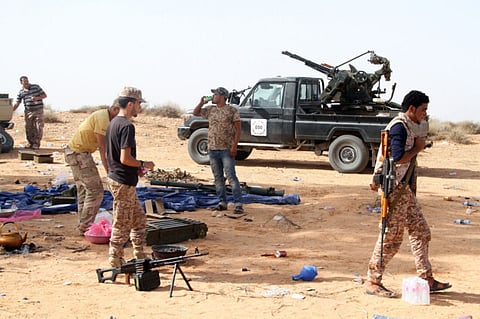Militants flock to Libya’s remote south to train
Militants flourish in Libya buoyed by the inability of authorities to tame armed groups

Tripoli: Libya’s remote desert south has become a haven for north African militants who have set up training camps in what has traditionally been a hotbed of arms smuggling, experts say.
Oil-rich Libya slid into chaos after veteran dictator Muammar Gaddafi was toppled and killed in a NATO-backed uprising three years ago.
Weapons looted from his arsenal have made their way to the so-called “Salvador Triangle”, a no-man’s land formed by the porous borders of Libya, Algeria and Niger, experts say.
For years the triangle was the backyard of smugglers and traffickers through which illicit weapons flowed easily between north Africa and countries in sub-Saharan Africa.
But since the uprising, the activity of militants with links to Al Qaida has flourished in the region, buoyed by the inability of the Libyan authorities to tame the armed groups.
On October 10, France said its forces had destroyed a convoy belonging to Al Qaida’s north African branch in Niger that was carrying arms from Libya to Mali.
The operation was part of a counter-terrorism campaign led by France to flush out militants, including Al Qaida in the Islamic Maghreb (AQMI), from the Sahel region.
Militants had occupied the desert north of Mali for 10 months before they were ousted in January 2013 in a French-led military intervention.
“The south of Libya has become a hideout for extremists following the French military intervention in Mali,” said Mohammad Fazzani, an expert on Islamist militant groups.
“It is very difficult for any army to control such a vast region, unless it has sophisticated technology” because the militants “know very well the terrain and can set up camps despite harsh conditions.”
An intelligence official, who declined to be named, told AFP that militants have set up three “secret camps” in southern Libya where hundreds of militants are training to fight in Mali, Iraq or Syria.
“These camps have become the key providers of combat-ready militants,” the source said.
Libya expert Jason Pack says militants pushed out from northern Mali have set up training camps in Libya’s south, adding that the region has become “much more” than a transit route for gunmen and smugglers.
“Drones have spotted training camps and Western intelligence officers have been to these places,” he said.
“I don’t have precise figures. But I’m sure that there are Libyans among these militant groups,” added Pack, a researcher on Libya at the University of Cambridge and president of Libya-analysis.com.
Both Pack and Fazzani also drew links between militants entrenched in Libya’s remote south and powerful Islamist militia in the north and east of the country.
These groups are challenging the authority of the government and the internationally recognised parliament elected in June, and have swept across the capital Tripoli and second city Benghazi in the east.
According to Fazzani the militants in the south received logistical support from Islamists in northern Libya.
In January 2013, militants coming in from Libya stormed the In Amenas desert gas plant in the far southeast of Algeria.
Around 40 hostages, all but one of them foreign, were killed in a bloody four-day siege and army operation that followed.
Army spokesman Colonel Ahmad Al Mesmari agrees that training camps have sprouted up in the remote south but told AFP that Libyan troops are ill-equipped and under-staffed to confront the militants.
“The army suffers from a lack of means and cannot carry out regular patrols in these immense regions,” Mesmari said.
“Furthermore, the armed forces are worn out by the fighting under way in the east and west of the country,” he said.
Since the revolution, the interim authorities have struggled to establish a regular army and police force and had to rely on state-backed militias to secure vital installations, including oil, airports and borders.
Libya’s Islamists include the Ansar Al Sharia militia, which the United States has branded a “terrorist” organisation, and Fajr Libya, a coalition of militias.
Fajr Libya seized Tripoli at the end of August after fierce fighting with the pro-government Zintan forces for control of the capital’s airport, and then extended its operations to the western Warshefana region.
Ansar Al Sharia has its stronghold in eastern Libya, where it has been locked in deadly fighting with the men of retired general Khalifa Haftar since May.
Sign up for the Daily Briefing
Get the latest news and updates straight to your inbox



